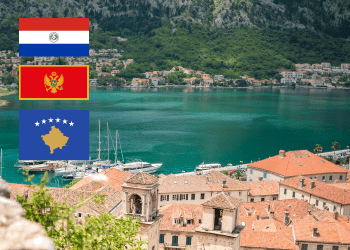Updates to the IP systems of Montenegro, Paraguay, and Kosovo

Montenegro
Montenegro is set to join the European Patent Convention (EPC), with the country's accession taking effect as of October 1, 2022. Montenegro deposited its instrument of accession on July 15, 2022, marking the 39th state to become an EPC member.
The country officially became an EPO Extension State and observer at the EPO's Administrative Council as of March 1, 2010, and formally requested accession to the EPC 8 years later, on July 23, 2018. This request was granted to Montenegro on December 29, 2021, paving the way for the eventual accession of the jurisdiction this year.
The EPC was initially founded in 1977 and constituted a total of 7 states, which will have grown by a further 32 states by the end of this year. The EPC represents successful international cooperation in regard to intellectual property throughout Europe and beyond, having steered the region toward an increase in innovation, effective IP protection, and economic growth.
Paraguay PPH
The National Directorate of Intellectual Property of Paraguay (DINAPI) has implemented the II Patent Accelerated Procedure Program (PPH). The resolution implementing the PPH program was signed on behalf of Paraguay on August 10, 2022.
The regional instrument was agreed upon and signed by the IP offices of the PROSUR PROSUL member states, comprising Brazil, Chile, Colombia, El Salvador, Peru, Ecuador, the Dominican Republic, Paraguay and Uruguay.
A PPH cooperation facilitates the collaboration of IP offices and enables a multilateral work-sharing agreement. As such, data and examination results conducted by one IP office within the regional PPH agreement are able to be shared with another, expediting the registration process for applicants who have applied in more than one country which is a party to the regional PPH agreement. This, in turn, eliminates the need for the examination process to take place in every state privy to the regional PPH agreement separately, expediting the registration process.
The advantage of having a more efficient and swift patent examination procedure is hoped to promote the IP system of Paraguay, and encourage further filings for patent protection in both the country and the PROSUR region.
The PPH Program has been extended for a period of five years between the member states of PROSUR.
Kosovo
Kosovo recently implemented a new trademark law on July 28, 2022, which harmonized national legislation with the relevant EU Directive on the approximation of the laws of the Member States relating to trademarks. In addition, the new law paves the way for the implementation of a further EU Directive in relation to the enforcement of intellectual property rights.
The changes to the legislation represent several significant amendments, including the abolition of the requirement of graphical representation to be included within a trademark application. This move is set to allow for more flexibility in terms of trademark representation, and provide for a less restrictive filing process.
Furthermore, applicants will henceforth be obliged to precisely define the list of goods and services for which protection is sought, implementing a more literal interpretation of class headings. Applicants may also be required by the IPO to submit a disclaimer on any non-distinctive elements of a mark should the trademark application include an element that might not be considered distinctive.
The new legislation has introduced additional absolute grounds for refusal. As such, a sign will not be registrable if it conflicts with an existing designation of origin, geographical indication, traditional term for wine, traditional speciality guaranteed or plant variety. Moreover, the law has introduced a new relative ground for refusal, with the possibility for trademark applications to be opposed on the basis of bad faith being implemented.
Also amongst the alterations brought about by the new trademark law, the scope of trademark infringement has been expanded. As such, additional uses of similar or identical signs that may be prohibited by trademark owners have been established. These include the use of a sign as a company name, within advertising, packaging, labels, tags and security or authenticity features or devices, and the placing of these on the market. In terms of the defense of non-use, defendant's in court proceedings are now allowed to request that the plaintiff show the use of the trademark claimed to have been infringed.
Additional amendments to the trademark law include the possibility to enforce trademarks in an administrative procedure by filing an appeal with the Market Inspectorate against an infringer. Furthermore, trademark owners are no longer able to prohibit the importation of genuine goods bearing their trademarks after they have placed them on certain markets. These markets include those of Kosovo, a member state of the EU or EEA or the Western Balkans region, or a state with which Kosovo has concluded a free trade or trade facilitation agreement.
The amendments to the trademark law of Kosovo bring about direct changes in line with European legislation, allowing for a more streamlined approach to IP protection to be adopted by the country. In turn, this is hoped to encourage an increase in interest of IP applicants in the jurisdiction, and strengthen the overall IP field.